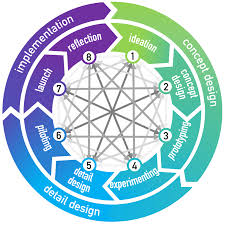The Role of Business in Today’s Society
Business plays a vital role in shaping the world we live in today. From providing goods and services to creating job opportunities and driving economic growth, businesses are the backbone of modern society.
Economic Growth and Innovation
Businesses are key drivers of economic growth. Through innovation, entrepreneurship, and investment, businesses create new products, services, and technologies that improve our quality of life and drive progress. They contribute to the overall prosperity of a nation by generating wealth and increasing productivity.
Job Creation and Employment
One of the most significant impacts of business is job creation. Businesses provide employment opportunities for individuals across various sectors, helping to reduce unemployment rates and improve living standards. By hiring workers, businesses not only support individuals and families but also contribute to the overall stability of society.
Social Responsibility
Businesses have a responsibility to operate ethically and contribute positively to society. Corporate social responsibility (CSR) initiatives focus on giving back to communities, protecting the environment, and upholding ethical business practices. By engaging in CSR activities, businesses can make a meaningful impact beyond their bottom line.
Global Connectivity
In today’s interconnected world, businesses play a crucial role in fostering global connectivity. Through international trade and partnerships, businesses facilitate the exchange of goods, services, ideas, and cultures across borders. This interconnectedness promotes collaboration and mutual understanding among nations.
Conclusion
Business is more than just profit-making; it is a driving force for positive change in society. By fostering economic growth, creating jobs, embracing social responsibility, and promoting global connectivity, businesses shape our world in profound ways. As we navigate an ever-changing landscape, the role of business continues to evolve as a force for progress and innovation.
6 Essential Tips for Building a Successful Business
- Always prioritize customer satisfaction to build loyalty and repeat business.
- Stay updated on industry trends and adapt your strategies accordingly.
- Focus on building strong relationships with clients, partners, and employees.
- Set clear goals and create a detailed plan to achieve them.
- Monitor your finances closely and make data-driven decisions for sustainable growth.
- Continuously seek feedback from customers and employees to improve your products or services.
Always prioritize customer satisfaction to build loyalty and repeat business.
Prioritizing customer satisfaction is a fundamental strategy for building loyalty and encouraging repeat business in the competitive world of commerce. By focusing on meeting and exceeding customer expectations, businesses can establish strong relationships with their clientele, leading to trust, loyalty, and positive word-of-mouth referrals. When customers feel valued and their needs are consistently met, they are more likely to return for future purchases and become advocates for the brand. Ultimately, a satisfied customer is not just a one-time transaction but a potential long-term supporter who can contribute significantly to the success and growth of a business.
Stay updated on industry trends and adapt your strategies accordingly.
To thrive in the competitive business landscape, it is crucial to stay informed about the latest industry trends and adapt your strategies accordingly. By keeping a pulse on market developments, emerging technologies, and changing consumer preferences, businesses can proactively adjust their approaches to remain relevant and competitive. Adapting to industry trends not only helps businesses stay ahead of the curve but also allows them to seize new opportunities and navigate challenges effectively. Embracing a mindset of continuous learning and adaptation is key to long-term success in today’s dynamic business environment.
Focus on building strong relationships with clients, partners, and employees.
Building strong relationships with clients, partners, and employees is essential for the success and sustainability of any business. By prioritizing open communication, trust, and mutual respect, businesses can cultivate long-lasting connections that lead to increased loyalty, collaboration, and productivity. Strong relationships with clients foster customer satisfaction and retention, while partnerships built on trust and shared goals can drive innovation and growth. Additionally, a positive work environment created through strong employee relationships boosts morale, engagement, and overall performance. Investing in building these relationships not only enhances the reputation of a business but also lays the foundation for long-term success in a competitive market.
Set clear goals and create a detailed plan to achieve them.
Setting clear goals and creating a detailed plan to achieve them is essential for the success of any business. By establishing specific objectives, businesses can focus their efforts and resources effectively. A well-defined plan outlines the steps needed to reach those goals, providing a roadmap for decision-making and progress tracking. This strategic approach not only enhances organizational clarity but also motivates teams to work cohesively towards a common purpose. Ultimately, setting clear goals and creating a detailed plan fosters accountability, efficiency, and success in the dynamic world of business.
Monitor your finances closely and make data-driven decisions for sustainable growth.
Monitoring your finances closely and making data-driven decisions are essential practices for ensuring sustainable growth in business. By keeping a close eye on your financial performance, including revenue, expenses, and cash flow, you can identify trends, opportunities, and potential risks. Utilizing data to inform your decision-making process allows you to make strategic choices that are backed by evidence and analysis. This approach not only helps in maximizing profitability but also enables you to adapt to changing market conditions and drive long-term success for your business.
Continuously seek feedback from customers and employees to improve your products or services.
Seeking feedback from both customers and employees is essential for any business looking to enhance its products or services. By actively listening to the needs and suggestions of customers, businesses can identify areas for improvement and tailor their offerings to better meet customer expectations. Similarly, gathering feedback from employees can provide valuable insights into operational processes and internal dynamics, leading to increased efficiency and employee satisfaction. Continuous feedback loops not only foster a culture of collaboration and innovation but also demonstrate a commitment to delivering exceptional quality and value to all stakeholders.





